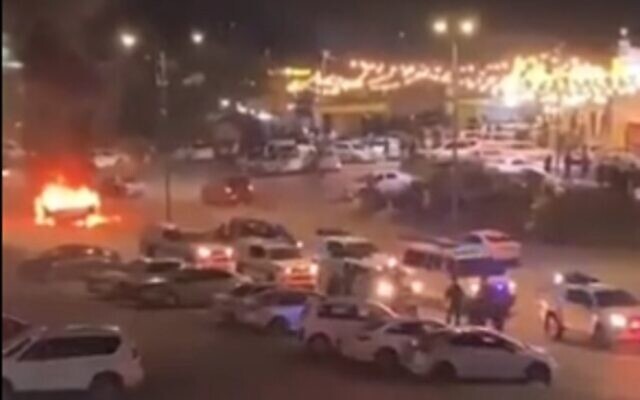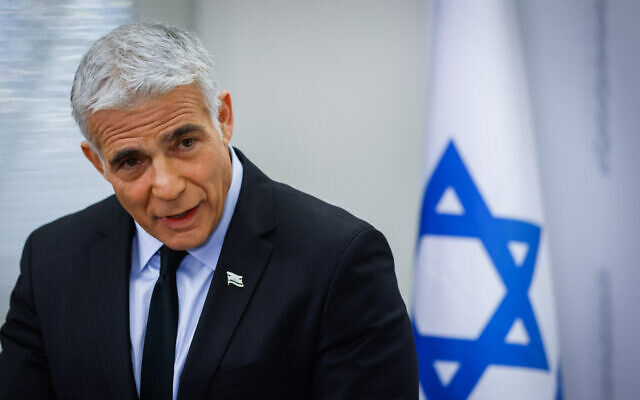PM Bennett’s political partner says it’s time to ‘reorganize’; Ra’am chief responds to Netanyahu criticism: You agreed to stop forestation and more

Amid high tensions and rioting by Bedouin in Israel’s south over forestation work being done in the Negev region, Foreign Minister Yair Lapid said Tuesday that the work should be halted until a solution can be found.
The planting program has set off violent protests as well as a coalition crisis as the Islamist Ra’am party is heavily invested in stopping the work, while the right-wing opposition takes advantage of this to portray Prime Minister Naftali Bennett’s government as weak in the face of pressure from Arab legislators.
Lapid stressed that violence must stop and that he fully backed “police action to bring back order.” But he said it would be wise to “stop now to reorganize,” noting that the previous government led by Benjamin Netanyahu also stopped forestation work in 2020 amid Bedouin protests.
Bedouin in southern Israel view the work by Keren Kayemet L’Yisrael-Jewish National Fund as a means of expelling those who live on the land. Ra’am’s voter base is among Arab communities in southern Israel.
Tuesday saw rioters in the Negev torch cars, block trains and clash with police in the south.
“Israel should plant trees on state lands, but we don’t need to harm the livelihood of local residents,” Lapid said. He also portrayed the crisis as being the result of “12 years of abandoning the Negev and neglecting the Bedouin problem” during the former premier’s tenure.
He added that “politicians on both sides need to calm things instead of fanning the flames.”

Netanyahu himself issued a combative statement, saying “No one will stop tree planting in the Land of Israel. I give my backing to security forces and demand that Bennett immediately condemn the incitement by Ra’am, his senior government partner.”
Ra’am party chief Mansour Abbas responded to the former premier, saying he too had agreed to stop such efforts when the two were discussing potential political cooperation last year.
“Not only did you agree to stop tree planting in the Negev, you also agreed to recognize three Bedouin communities and agreed to my request in one of the sitdowns [at the Prime Minister’s Office] to delay the evacuation of families from their homes in [East Jerusalem’s] Sheikh Jarah. MK Netanyahu, breathe, take things in and maybe move on.”
Another member of the government, Communications Minister Yoaz Hendel of the right-wing New Hope party, took a more hawkish stance on the unrest.
“There must be no tolerance toward rioting in the Negev,” he said. “The loss of governance in the Galilee and the Negev under Likud’s leadership is no excuse. We are leading and we have no choice but to bring back sovereignty in the Negev.”
Likud’s MK Yair Levin, meanwhile, accused the government of a “total loss of control. It lost control of infections and of managing the coronavirus pandemic and it’s now losing control in the Negev.” He called Lapid’s comments “an immediate capitulation to terror” and “an astonishing display of weakness and a basic misunderstanding of the reality we live in.”
Abbas has threatened to stop voting with the coalition if the forestation work continues.
“I can’t continue to live with this,” Abbas told Channel 12. “I can’t continue like this. I have absorbed more difficult things in the past, but when they shoot straight in my chest I can’t stand it anymore. The Negev is Ra’am.”
He also demanded an “accelerated process” for resolving the matter.
However, the network said Housing Minister Ze’ev Elkin of the New Hope party, whose ministry oversees the tree planting, was opposed to halting the work.
With an razor-thin parliamentary majority of 61 seats in the 120-seat Knesset, the coalition is reliant on Ra’am’s support.
Following the threat by Abbas, Hebrew media reported that the coalition instructed all its members to be at the Knesset on Wednesday to take part in plenum votes, except for those infected with COVID-19.
בתיעוד נוסף מהמהומות סביב נטיעות קק”ל בנגב, נראה רכב בוער סמוך למחלף שגב שלום@Itsik_zuarets pic.twitter.com/202ajX293E
— כאן חדשות (@kann_news) January 11, 2022
The controversy over the planting began a few weeks ago, when KKL began its foresting in a region settled by Bedouin from the al-Atrash tribe. A local Bedouin municipal official estimated that thousands live on the land intended for foresting and could be expelled as the planting continued.
The Israeli government has determined that land is publicly owned, but the local Bedouin residents claim that the land belongs to them.
“As part of this work, they have destroyed tin homes of those living in the area and planted the land with trees — all so as to take over the land,” said Yaqoub Dreijat, a political adviser in the Al-Kasom regional council.
Negev Bedouin have a contentious relationship with the Israeli state. For decades, the Israeli government has sought to move the Bedouin into recognized, planned cities, but many still live in a constellation of illegal hamlets that sprawl across Israel’s southern desert.
Bedouins accuse KKL of seeking to displace them, but KKL says it is merely fulfilling a request by other government bodies on public land. KKL works across Israel on nature and conservation projects, but some charge the organization has a political agenda.
“This is a kind of soft expulsion in the guise of ecological work,” charged Thabet Abu Rass, who co-directs the Abraham Initiatives shared society nonprofit.
Police reported several acts of violence suspected of being linked to the protests against the tree planting.
In one incident, a passenger train was forced to brake after stones were placed on the tracks, according to police. The stones were removed and an investigation was opened, as officers called to the scene scoured the area for possible suspects.
Police also said there was rioting along Route 25, parts of which were temporarily closed. According to a police statement, rocks were thrown at a bus and a car, causing damage. Videos and pictures showed tires and garbage bins on fire in the road. A car belonging to a reporter from Haaretz was set on fire at the entrance to Segev Shalom.
Police later said officers had “gained control over the incident” at the Segev Shalom Junction, where two cops were lightly injured by a rock and firecracker.
“The police operations at the scene are continuing, while showing zero tolerance toward rioters,” the statement said.
The rioting came after clashes between police and Bedouin at a KKL-JNF planting site earlier in the day, during which 18 protesters were arrested on suspicion of disturbing the peace, seven of them minors.
Earlier, a delegation of Knesset members from Netanyahu’s Likud party took part in a tree-planting ceremony in the KKL-controlled Yatir Forest in the south. Separately, the MKs faced criticism for planting trees during the shmita sabbatical year.
As reported by The Times of Israel
